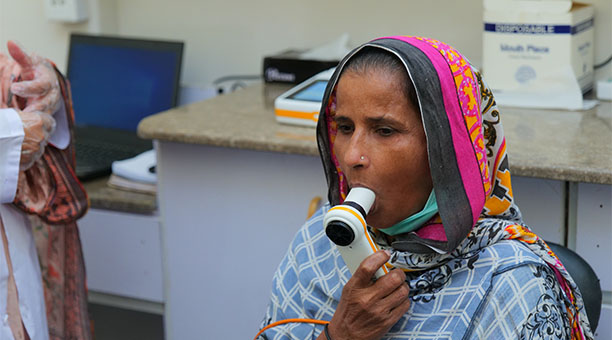Why Increasing Asthma Cases in Pakistan Demand Action and Awareness
Asthma, one of the central respiratory diseases, affects nearly 4.3% of Pakistan's population. The condition prevails in both adults and children, leading to multiple health complications. Many developing nations, including Pakistan, are struggling to combat the growing asthma crises. However, underdiagnosis, People's obliviousness:, and resource scarcity significantly hinder effective management. Let's try to get a clear picture of asthma awareness in Pakistan:
Understanding Asthma
Asthma is a chronic respiratory disease that causes breathing difficulties. It is a condition in which your airways become inflamed and excessive mucus builds up. Due to the narrow path, breathing obstruction occurs along with other symptoms like wheezing, coughing, chest tightness, etc. Emergency treatment is mandatory if symptoms are severe and accompanied by sweating faintness, and pale skin. Asthma can be a life-threatening condition if left untreated.
Causes and Risk Factors
Asthma may occur due to genetic predisposition. However, environmental factors also play a keen role. Certain irritants, such as dust mites in carpets, pet dander, tobacco, and smoke, may cause asthma or worsen the condition. Additional factors, like a sedentary lifestyle, stress, and indoor air pollutants, can also exacerbate the condition.
How Common is Asthma in Pakistan?
Unfortunately, asthma is highly prevalent in Pakistan, affecting both urban and rural populations. A few studies highlighted controlled asthma in urban areas, compared to the rural side of Pakistan. Due to lack of awareness, limited resources, and budget constraints, the underprivileged face severe challenges in diagnosis and treatment. SHINE Humanity recently conducted research revealing biomass burning as the primary culprit behind high asthma prevalence. Burning wood and animal dung release harmful gases that irritate the respiratory system, leading to chronic conditions like asthma. For integrity in the claim, research was conducted on our patients at the SHINE Humanity Garibsons Clinic in Gharo, emphasizing the urgent need for awareness and action.
Regrettably, people in Pakistan are unaware of the negative health consequences of indoor air pollution. Other underlying factors are limited access to clean energy resources and some cultural traditions. Most cases of seasonal asthma are reported in the urban areas. In Islamabad, pollen levels are alarmingly high during March and April, resulting in more asthma cases. Winter and early spring are the most challenging seasons in other parts of the country due to airborne allergies. Occupational asthma is also common in Pakistan as industrial and factory employees work in closed environments. The absence of ventilation and unhygienic working conditions poses a significant risk for workers.
Although many cases remain underdiagnosed, Pakistan has taken some initiatives to battle the healthcare issue. The country has around 100,000 trained physicians for asthma treatment. Besides this, Pakistan follows the Global Initiative for Asthma (GINA) policies, which also organizes World Asthma Day every year on May 7th for awareness and care. Moreover, the Pakistan Chest Society emphasizes patient awareness and physician training and releases regular guidelines.
Challenges in Asthma Control
Being a developing nation, Pakistan faces several challenges in controlling asthma. A few of them include:
Asthma Stigmatization
Asthma is considered a stigma due to cultural and social norms, mainly if the affected person is a female. As per societal norms, people show reluctance to marry a woman who has asthma -due to the perceived assumption that it could be transmitted. Likewise, relatives prefer maintaining distance and consider it contagious. Many people even ignore the symptoms, which is why the symptoms exacerbate and the condition becomes unstable.
Lack of Awareness
Since most people are unaware of its severe consequences, non-adherence to a physician's advice is expected. Patients often discontinue medications after a specific time and do not use inhalers even if advised. They consider inhalers as life-long dependency tools and show reluctance to adopt preventive measures.
Poor Healthcare Facilities
Although some medical clinics are in rural areas, more healthcare facilities are needed to treat the growing number of cases. Besides this, cost-free inhalers are unavailable for the less privileged and are often required in asthma treatment. The underprivileged group also requires training regarding the use of inhalers, but unfortunately, well-trained paramedical staff are not available.
Unhealthy Lifestyle
Poor dietary habits lead to obesity, which is associated with asthma. Likewise, tobacco smoke and even secondhand smoke damage the cilia (which are responsible for clearing dust mites from entering the airways). Cleanliness and hygiene are other essential factors for asthma prevention, but people are unaware of how the use of carpets, pets, and air pollution triggers asthma.
Lack of Trained Physicians
Most physicians rely only on textbook knowledge due to the absence of training programs. Only a few professionals specialize in respiratory diseases. This small percentage of specialized physicians tend to practice in the main cities to earn lucrative remuneration.
Final Thoughts
Asthma is a controllable respiratory condition, and effective management can successfully curtail the mortality rate due to chronic asthmatic attacks. However, addressing the growing cases in Pakistan requires immediate attention. Awareness campaigns in underprivileged areas, healthcare accessibility, and infrastructural modifications are mandatory. SHINE Humanity asthma program aims to bridge the asthma diagnosis and management gap. Our clinics in rural Sindh are helping countless individuals in this battle. We conduct spirometry tests to screen patients with chronic asthmatic conditions. We also provide life-saving medications, inhalers, and awareness regarding its treatment.
In this journey, we cannot address the grievances of severely affected asthmatic individuals alone. We need your assistance in this initiative to fight against the menace of asthma. Let’s collaborate to save countless lives by spreading awareness, setting up medical camps, and equipping physicians with the necessary skills. To contribute to this humanitarian venture, donate to SHINE Humanity!
